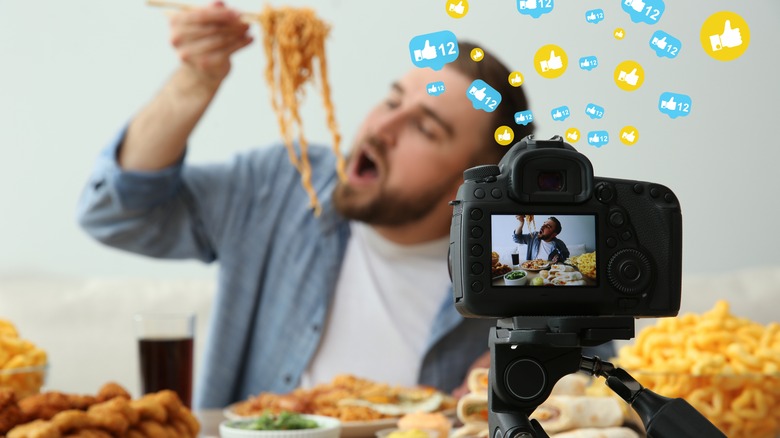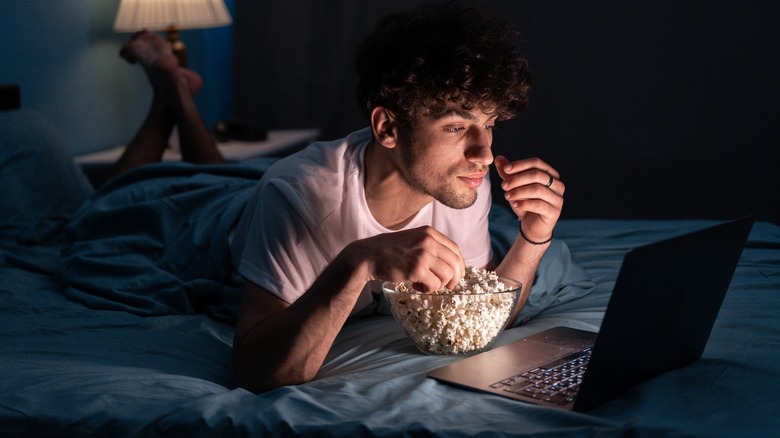The Hidden Dangers Of The Viral 'Mukbang' Eating Trend
Would you spend hours watching someone eat on camera, and compensating them for their time? If so, you've been captivated by mukbang culture. Although mukbanging — the act of eating substantial portions of food for online viewers — first emerged on the social media scene in the late 2010s, it's once again taking off as a viral trend. The goal of so-called mukbangers is both practical and social: Earn money by doing something ordinary (e.g., eating) in an extraordinary way (e.g., eating lots of interesting, fattening, or exotic dishes in one sitting.)
In a 2023 review published in Cureus, the authors concluded that mukbanging provided a sense of escapism. And there's little argument that engaging in a mukbang session is meant to transport viewers into a different culinary realm than they're accustomed to. However, mukbang eating may not be as harmlessly entertaining as it first appears. As it turns out, regular binge eating can have some dangerous physical and mental consequences for mukbangers and their audiences.
Troubling stomach and intestinal developments for mukbang celebrities
One of the most serious concerns with being a mukbang host is the havoc that mukbanging can wreak on your stomach. If you consume tons of food and loads of calories, your gut might not be as appreciative as your followers.
Andrea Soares, a certified registered dietitian at Top Nutrition Coaching, warns that mukbanging can lead to acute and chronic gastrointestinal problems. "Eating large amounts of food in one sitting can put immense pressure on the digestive system," says Soares. "Mukbang stars may experience severe discomfort, nausea, or even a life-threatening condition called gastric rupture, where the stomach tears from the strain." Soares adds that repeatedly overeating can also put mukbangers at greater risk of obesity, cardiovascular disease, and Type 2 diabetes.
Soares' and other experts' worries about the short-term and lasting stomach-related effects of mukbangs aren't just theoretical. They're all too real. In 2024, Pan Xiaoting, an extreme competitive eater from China, collapsed while livestreaming a mukbang. Media soon reported that she was dead, ostensibly from a ruptured stomach, according to reporting from The Times of India.
Mukbanging's psychological impact on eaters and watchers
The possible worries about mukbanging extend beyond the pressures on the body and its systems by eating plenty of food in one sitting. In fact, mukbanging behaviors may damage an individual's emotional state, even giving rise to disordered eating. Explains Soares, "It's easy for mukbang hosts to fall into a cycle of binge eating, which can evolve into serious eating disorders." And that's not all: "Mukbang creators often feel the need to outdo themselves, attract viewers, and stay relevant, leading to significant stress and anxiety. The pressure to maintain an audience and constantly push limits can take a toll on their mental health."
Mental health issues can extend to viewers, too, especially those who have a history of disordered eating and, therefore, may be triggered by watching someone eat shockingly large quantities of food. In an interview for a 2023 ABC News piece on mukbanging, nutritionist Maya Feller talked about this phenomenon. Specifically, Feller noted that "for people who have a history of eating disorders or who have active eating disorders . . . it [a mukbang] can be really triggering and confusing."
Still, despite mukbanging's darker side, it may be a positive experience for some people. As one mukbang fan told MarketWatch in 2019, watching mukbangs helped her manage her weight. Instead of overeating, she watched others do it. She claims that letting mukbangers overeat enabled her to maintain a nutrient-rich diet and shed pounds while enjoying food vicariously.


